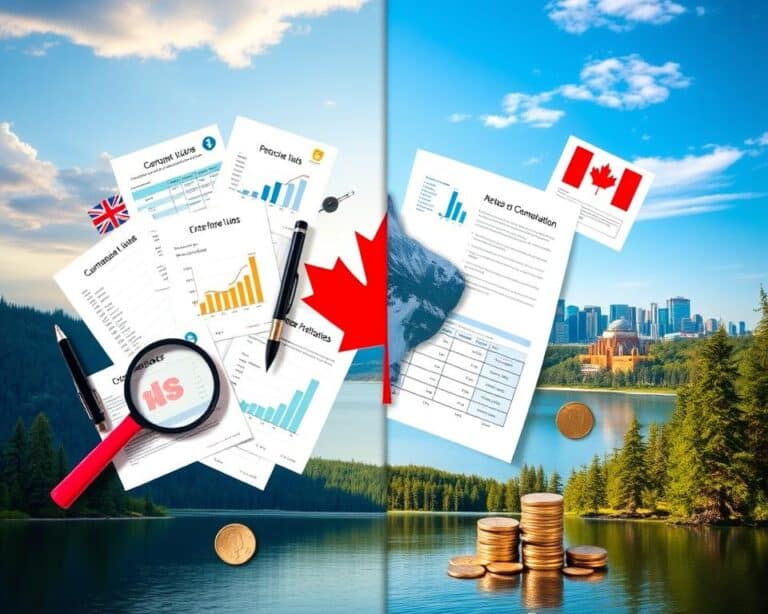advertisement
Did you know over 30% of Canadians have thought about getting personal loans? This shows how important it is to know about personal loans. They help with big purchases, unexpected costs, or debt consolidation. Canadian personal loans are key for many people.
We’ll explain what personal loans are and why they matter. Knowing the different types and their uses helps you make smart choices. So, let’s see how personal loans Canada can help you!
Understanding Personal Loans
Personal loans are key financial tools for many needs, like paying off debt or big purchases. Knowing what personal loans are helps you make smart money choices. They come in two types: secured and unsecured. The main difference is if you need to offer collateral.
What Are Personal Loans?
Simply put, personal loans are money you borrow from a lender to pay back later. Unsecured loans don’t need collateral, relying on your credit score for approval and rates. Secured loans, however, ask for collateral, which can lower your interest rate because it’s safer for the lender.
Types of Personal Loans Available
There are many personal loan types to fit different needs:
- Installment Loans: These loans have fixed payments over a set time, making it simpler to budget.
- Revolving Credit: This lets you borrow up to a certain limit, like a credit card, and pay it back.
- Peer-to-Peer Lending: This new way connects you with lenders directly, often offering better rates and terms.
Knowing about the different personal loans in Canada helps you pick the right one for your financial needs.
Why Consider a Personal Loan in Canada?
Personal loans can be a powerful tool in your financial toolkit. They offer various benefits that can enhance your overall financial health. By understanding the key advantages, you can make informed decisions about your personal finance journey.
Debt Consolidation and Financial Freedom
One significant benefit of personal loans is their ability to facilitate debt consolidation. If you are juggling multiple high-interest debts, a personal loan can streamline your payments. By consolidating these debts into a single, manageable monthly payment, you may lower your overall interest rates and simplify your budgeting.
This approach can lead to greater financial freedom. It allows you to focus on other priorities.
Healthcare and Emergency Expenses
Healthcare costs can arise unexpectedly, creating financial strain. Personal loans can help by covering these urgent health-related expenses. Whether it’s medical bills, dental work, or emergency procedures, having access to funds when needed is invaluable.
Additionally, personal loans can act as a crucial resource for building emergency funds. In times of financial uncertainty, knowing you have options can provide peace of mind.
| Use of Personal Loans | Benefits |
|---|---|
| Debt Consolidation | Simplifies payments and reduces interest rates |
| Healthcare Expenses | Covers unexpected medical bills and services |
| Emergency Funds | Provides financial support during unforeseen events |
Factors to Consider Before Applying
Before you apply for a personal loan, there are key things to think about. Your credit score and financial health are very important. Knowing about loan amounts and repayment terms helps you make smart choices.
Your Credit Score and Financial Health
Your credit score shows how well you handle money. Lenders look at it to decide if you’re a good borrower. A better score means you might get lower interest rates and more loan options.
Improving your credit score can help a lot. Pay off debts and make payments on time. This can make you more likely to get good loan terms.
Loan Amounts and Repayment Terms
Choosing the right personal loan amounts is key to managing money well. Think about what you really need and avoid borrowing too much. It’s also important to understand repayment terms.
Look at the loan’s duration, monthly payments, and interest rates. Pick terms that fit your budget. This way, you can stay comfortable and avoid debt problems.

| Factor | Description |
|---|---|
| Credit Score | Indicates your creditworthiness and influences loan terms. |
| Financial Health | Includes your income, savings, and existing debts. |
| Personal Loan Amounts | The total amount you intend to borrow. |
| Repayment Terms | Duration of the loan and conditions for repayment. |
Think about these factors carefully. This way, you can borrow responsibly. Good planning makes your loan experience easier and helps your financial future.
Personal Loans Canada: The Application Process
Applying for a personal loan can seem daunting. But, by breaking it down into simple steps, it becomes more manageable. Knowing what documents you need and following the right steps will prepare you for the loan application.
Preparing Your Documents
Start by collecting all the documents you’ll need. You’ll usually require:
- Proof of income: Recent pay stubs or a tax return
- Identification: Government-issued ID such as a driver’s license or passport
- Credit history: A recent credit report to understand your standing
- Bank statements: To verify your financial situation and stability
Steps to Successfully Apply for a Loan
With your documents in hand, follow these steps to improve your chances of approval:
- Choose a lender: Research different options, such as banks or online lenders
- Submit your application: Fill out the forms accurately, using your prepared documents
- Understand the approval process: Be aware that lenders may take several days to assess your application
Where to Find Personal Loans in Canada
Finding personal loans in Canada can be tricky, with many options available. Traditional banks and online lenders have their own pros and cons. It’s key to know how they compare to find the best deal. Credit unions and alternative lenders offer unique benefits and personalized service. Loan comparison sites are vital for comparing offers and making an informed choice.
Traditional Banks vs. Online Lenders
Traditional banks are a common choice for personal loans. They offer large loan amounts and reliable service. But, the application process can be slow. Online lenders, on the other hand, make it easy to apply and get funds quickly. Yet, not all online lenders have good rates or terms, so be careful.
Credit Unions and Alternative Lenders
Credit unions are a good option too. They are owned by members and often have lower rates. They also consider your financial situation more than just your credit score. Alternative lenders can help if you don’t qualify elsewhere. But, it’s important to check their rates and terms carefully.
Loan Comparison Websites
Loan comparison sites make it easy to compare offers. You can filter by interest rates, repayment terms, and lender reputation. This helps you find the right loan for your needs. By comparing different lenders, you can choose the best one for you.
Interest Rates and Fees Explained
When you look at personal loans, it’s key to know the costs involved. Pay close attention to interest rates and the annual percentage rate (APR). These can greatly affect how much you’ll pay back, impacting your finances over time.
Understanding APR and Its Importance
The APR shows the total cost of borrowing, including interest and fees over the loan’s term. Knowing APR helps you see what you’ll pay over the loan’s life. It’s also important for comparing loans, as a lower rate might mean higher fees. Understanding APR helps you make smart financial choices.
Hidden Fees to Watch Out For
When you’re looking at personal loans, watch out for hidden fees that can increase your costs. These fees are often missed, leading to surprise expenses. Some common hidden fees include:
- Origination Fees – Charged by lenders for processing the loan.
- Prepayment Penalties – If you pay off your loan early, some lenders may impose fees.
- Late Payment Fees – Missing a payment deadline can result in extra charges.
Being aware of these hidden fees helps you understand your financial commitment before agreeing to a loan. Here’s a table showing common personal loan fees:
| Fee Type | Description | Typical Amount | Notes |
|---|---|---|---|
| Origination Fee | Fee charged for processing the loan | 1% – 5% of the loan amount | Often deducted from loan proceeds |
| Prepayment Penalty | Fee for paying off the loan early | Varies by lender | Check loan terms carefully |
| Late Payment Fee | Fee for failing to make a payment on time | $25 – $50 | May impact your credit score |

Managing Your Personal Loan Effectively
After getting a personal loan, managing it well is key. This ensures you pay back on time and stay financially stable. Making a detailed loan repayment budget and following some helpful tips can improve your financial skills.
Creating a Budget for Repayment
Making a solid loan repayment budget is crucial. It helps you manage your money better. Start by listing all your income and necessary expenses. Then, decide how much you can afford to pay each month.
Remember to consider any possible interest rate changes or unexpected costs. These can affect your payments during the loan term.
Tips for Staying on Track
To keep up with your loan payments, you need to be proactive. Here are some useful tips:
- Set up automatic transfers: This way, your payments are made on time, avoiding late fees.
- Create reminders: Use apps or calendars to remind you of payment due dates. It keeps you organized.
- Communicate with lenders: If money gets tight, talk to your lender. They might offer flexible solutions or payment plans.
Using these strategies makes managing personal loans easier. It helps you manage your finances well during the loan period.
Common Misconceptions About Personal Loans
When thinking about personal loans, it’s key to debunk common myths. Many myths stop people from looking into good financial choices. Knowing these myths helps you make better decisions about debt and borrowing.
It’s Only for People in Debt
Many think personal loans are only for those in debt. But, they can also help with big purchases, combining debts, or covering sudden costs. Using a personal loan wisely can actually improve your finances, not harm it.
Personal Loans Are Always Bad
Some believe personal loans are always bad, linked to high-interest rates and financial problems. This ignores the many ways to manage debt well. With careful planning and budgeting, personal loans can help you reach your financial goals.
| Misconception | Reality |
|---|---|
| Only for people in debt | Useful for various financial needs, including emergencies and purchases. |
| Always a bad option | Can be managed responsibly to support financial goals. |
| High-interest rates are standard | Rates depend on credit scores and lender options. |
| Personal loans will affect credit negatively | They can improve credit when repaid on time. |
By clearing up these myths, you see personal loans offer many financial options. Understanding the truth behind these myths can give you confidence in managing your finances.
Conclusion
In this article, we’ve covered personal loans in Canada in detail. They can be a big help in your financial planning. Knowing about different loans, how to apply, and the costs involved helps you make better choices.
Personal loans can help with unexpected bills or combining debts. This can lead to financial stability for you.
When looking at loans, always borrow responsibly. Good personal finance means your actions match your future goals. By thinking about the pros and cons and knowing your finances, you can make smart choices.
Being informed is key to your financial path. This article’s tips can help with debt or big purchases. Remember, using personal loans wisely can help you achieve your dreams.
FAQ
What are personal loans and how do they work?
Personal loans are loans you can get for different needs. This includes paying off debt or buying something big. You borrow money and pay it back in installments over time, with interest.
What types of personal loans are available in Canada?
In Canada, you can get many kinds of personal loans. These include unsecured and secured loans, installment loans, and more. Each has its own interest rates and rules.
Why should I consider a personal loan for debt consolidation?
Personal loans can help you combine debts into one. This can lower your interest rate and monthly payments. It makes managing your money easier.
How does my credit score affect my personal loan options?
Your credit score is very important for loans. A better score means better loan terms. So, check your credit before applying.
What documents do I need to apply for a personal loan in Canada?
You’ll need to show proof of income, ID, and credit history for a loan. Having these ready can make the process faster.
Should I choose a traditional bank or an online lender for my personal loan?
Banks offer personal service and many loan options. Online lenders are quick and might have lower rates. Choose based on what you need.
What are common fees associated with personal loans?
Personal loans can have fees like origination and late fees. Knowing these can help you avoid surprises.
How can I manage my personal loan repayment effectively?
Make a budget for loan payments and set up automatic transfers. This helps you stay on track and avoid missing payments.
What are some misconceptions about personal loans?
Some think personal loans are only for debt. But they can also help you reach goals. Used wisely, they can improve your finances.



